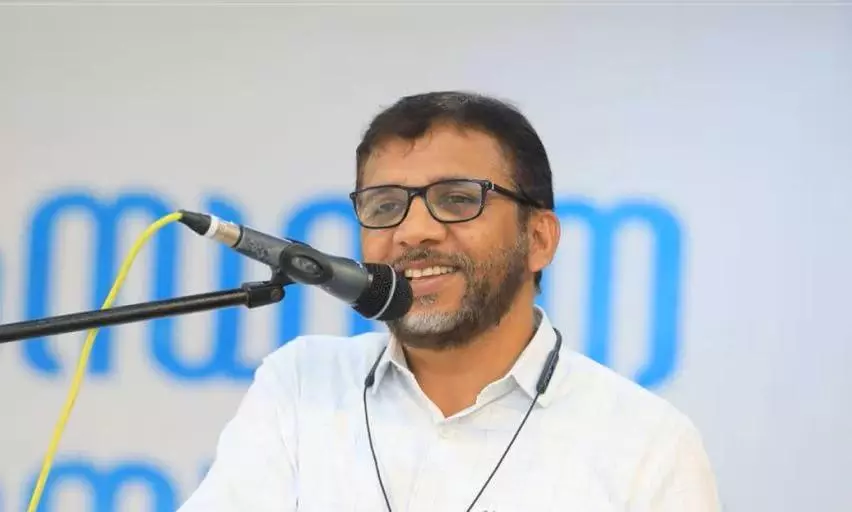
Kerala CM, under fire for RSS links, finds solace labelling Jamaat-e-Islami as extremist: Mujeeb Rahman
text_fieldsIn a recent book launch event, Kerala Chief Minister Pinarayi Vijayan made contentious remarks about Jamaat-e-Islami Hind (JIH), labelling the organisation as “anti-democratic” and “imperialistic.”
His statements, aimed at discrediting a lawful entity operating under the Indian Constitution, have ignited a debate over the political motives behind such claims and the potential implications for communal harmony in the state.
The book launch, featuring the work “Keralam Muslim Rashtriyam, Rashtriya Islam” by CPI(M) colleague P. Jayarajan, served as a platform for Vijayan to air allegations that JIH seeks to revert society to an era dominated by Caliphates and aims to establish an Islamic empire.
Drawing parallels with the Rashtriya Swayamsevak Sangh (RSS), he described JIH as an “Islamic version of the RSS,” accusing both organisations of undermining secular democracy.
Furthermore, he asserted that JIH has ties with the Shia faction in Yemen, and the Muslim Brotherhood in Egypt, and collaborates with the United States, framing the organisation as one involved in violent upheavals and evaluating nations purely through a religious lens.
These characterisations of JIH as an extremist group starkly contrast with the organisation's longstanding commitment to peaceful activism within the Indian legal framework. JIH has operated in India for decades, focusing on education, social welfare, and the promotion of justice.
Such efforts exemplify its dedication to national development and peaceful coexistence among diverse communities. Critics argue that labelling JIH as imperialistic is not only unfounded but also a deliberate attempt to malign principled Islamic organisations as inherently subversive, thereby perpetuating harmful stereotypes.
The backlash against Vijayan’s remarks has been robust, with many asserting that they represent an irresponsible political strategy designed to deflect attention from his own party’s ideological contradictions.
P. Mujeeb Rahman, the President of Jamaat-e-Islami Hind in Kerala, noted that the Chief Minister’s comments were more about attacking JIH than engaging with the substance of the book. This observation highlights a broader concern that Vijayan’s rhetoric echoes that of right-wing groups, accusing JIH of divisiveness, which has long been a criticism directed at the RSS itself.
Critics of the CPI(M) also point to a pattern of targeting Muslim organisations with baseless allegations of extremism. Jamaat-e-Islami Hind maintains a clean record, with no history of criminal or terrorist activities, and consistently advocates for non-violence.
Observers have pointed out that the CPI(M) has historically aligned itself with various Muslim leaders, including those who have faced accusations of militancy. This selective outrage raises questions about the authenticity of the CPI(M)’s current stance against JIH, suggesting a politically motivated narrative rather than a genuine concern for communal harmony.
The role of Jamaat-e-Islami Hind in promoting social cohesion cannot be overlooked. The organisation has been instrumental in addressing issues of mob lynching and communal violence, working collaboratively with Muslim coordination committees to foster peace.
Contrary to the Chief Minister’s implications, JIH has not engaged in dialogues with the RSS or sought to exploit religious identities for divisive purposes. Instead, Jamaat’s commitment to the Islamic principles of universal brotherhood underscores its aim to respect and promote equality among all communities.
The Chief Minister's unfounded assertions have prompted calls for accountability. Many argue that public officials must avoid inflammatory rhetoric that could exacerbate societal divisions. Rahman has urged Vijayan to substantiate his claims with evidence or retract his statements to prevent further misunderstandings and accusations against JIH.
The demand for accountability highlights the need for responsible governance, especially in a diverse society where communal tensions can be easily inflamed by careless remarks.






















